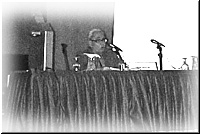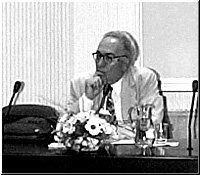
The founder of the Department of History, Professor İnalcik,
was the keynote speaker at the symposium.

Hilmi Yavuz talks next to a pile
of the 38 published works he's produced.

From left: Yılmaz Esmer, Metin Heper, Binnaz Toprak, and Nilüfer Göle
discuss religion, society, and politics in Turkey.
The greatest Ottoman historian alive, Bilkent's Professor Halil Ünalcİk; the great poet of Turkish literature, Professor Hilmi Yavuz; and four influential political scientists/sociologists all took part in a series of intellectual activities - a symposium, a talk, and a panel - at the University last week.
The significance of the symposium was underscored by the opening remarks of Dr. Mehmet Kalpaklı. He said the founding of the Ottoman State still remains a largely ignored period of Ottoman history. Therefore, the Department of History organized the symposium "From Osman to Mehmed the Conqueror: The Birth of the Ottoman State and the Establishment of the Empire" in order to bring this neglected area to wider scholarly attention. The purpose was to shed new light on the main aspects of this formative period; consequently, the approach was multi-disciplinary: presentations were delivered on a number of subjects ranging from politics and art history to language and literature.
Professor, philosopher, writer, and poet Hilmi Yavuz was invited to Bilkent by the Department of Turkish Literature and Center for Turkish Literature. Hilmi Yavuz, known for his thematic poems on evening and melancholy, talked about himself and his poetry, reading one poem from each of his 10 books. He was introduced by one of his former students who now teaches at the Department of Turkish Literature, Süha Oğuzertem.
In his speech, Hilmi Yavuz mentioned that he takes himself and his poetry very seriously and he believes that poetry should not be loaded with a mission of guidance. To him, the reader should be allowed to interpret his lines freely. He believes intellectuals should be autonomous, not the followers of an ideology.
He answered questions from the audience and autographed his books after his talk.
The Center for Turkish Politics and History organized its first event of the year, a panel on Religion, Society, and Politics in Turkey. The recent general and local elections in Turkey shaped the agenda of the panel, and the panelists interpreted the election results from the perspectives of Republican ideology, the rise of nationalism, and the decline of political Islam.
The concluding remarks included a statement that the Turkish public is tolerant of diversity but not open to the idea of an Islamic state. The mainstream belief is that religion should not play an important role in politics.
Comments made by the panelists created discussion among audience and panel members.

|







